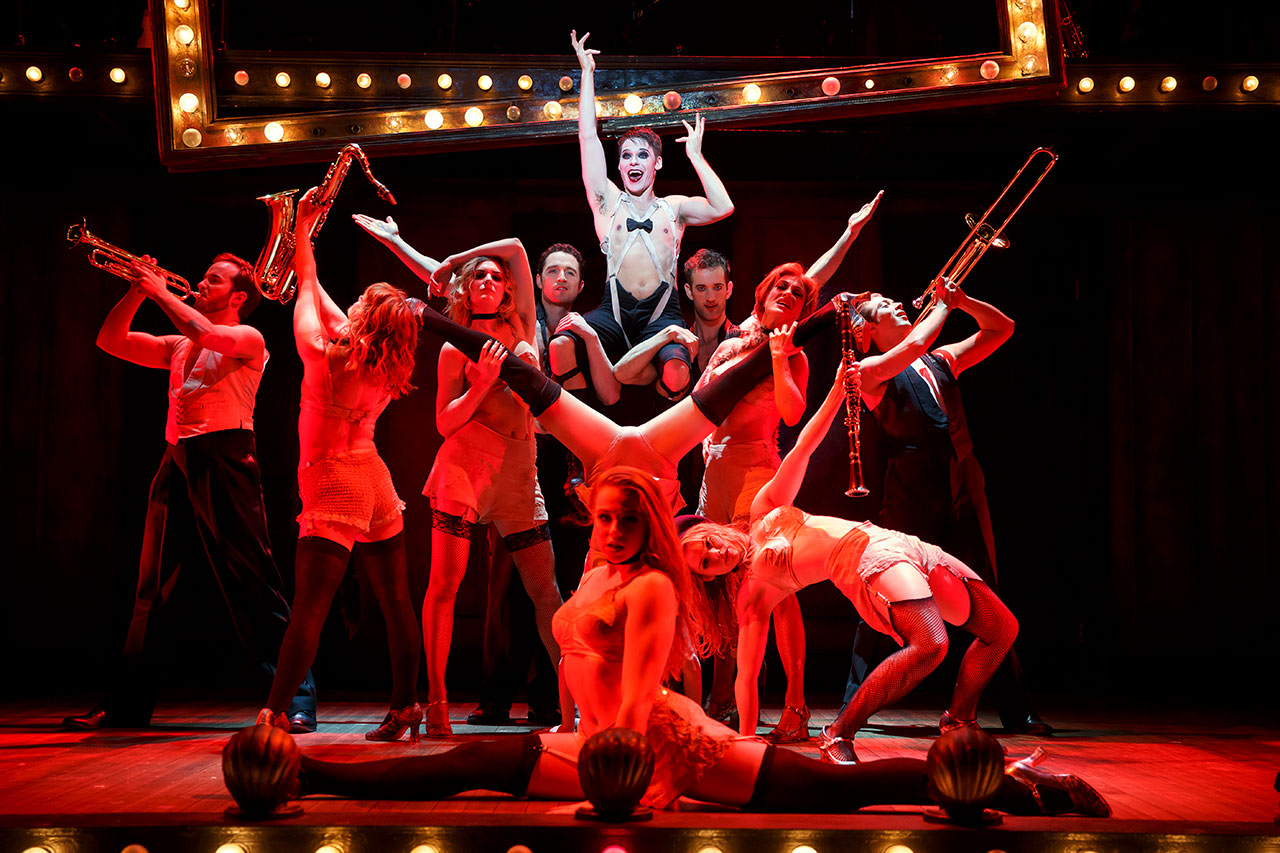Life is a Cabaret! Broadway's 'Cabaret' Touches Down in Boston

Jenna Glazier ’20 / Emertainment Monthly Staff Writer
In the Boston Opera House, life is truly beautiful. The Roundabout Theater Company’s production of Cabaret is currently on tour in Boston and it serves as a brutal but incredible wake up call to its audiences. From the moment the show begins, with the classic, sensual Emcee welcoming the audience into this new universe, the spell is immediately cast.
The audience is captivated as the shimmering curtain rises to reveal the outstanding orchestra, which also doubles as the ensemble—a brilliant and breathtaking group of performers who could sing and dance circles around anyone. Instantly, the raunchy yet romantic set, decorated with not much more than three doors and a red wall, pulls the audience deeper into the dangerous ignorance of the Kit Kat Klub.
Along with the perfectly exposed set, the choreography, recreated by Cynthia Onrubia, was as much a symbol of the raw sexuality, blissful ignorance, and torn conscious seen throughout the show as any other aspect of the production. The most stand out number of Roundabout’s production was, without a doubt, the incredible Andrea Goss as Sally Bowles and the ensemble performing “Mein Heirr.” From the darkness of the costumes to the rebel cry of the lyrics, this musical number was an absolute showstopper. Andrea Gross interrupts the space-time continuum with her powerhouse of a voice, and the ensemble is stunning as they perform the intricate, yet Fosse-inspired, choreography. “Mein Heirr” incorporates an immense amount of feistiness and power from Sally’s character while she stuns the audience with her grand finale at the club. Throughout the show, Onrubia’s choreography is a constant symbol of what is currently happening in the scene. From the military-like synchronization in the beginning of Act II to the wild, sporadic, even free movements in most of the musical numbers during Act I. Without even hearing the music, words, or dialogue, it is not at all far-fetched to say one could easily be just as captivated and effected by this story just by watching the choreography.
Although the cast of the national tour of Cabaret was exceptional as a whole, Randy Harrison as the Emcee was pure magic to watch. Harrison’s performance as the Emcee brought fun, and sexuality, but also a somber gravity to the shows overall message. Watching Harrison go from the playfulness of “Willkommen” to the heart-wrenching, infamous ending of the production was a true honor. Whenever Harrison entered, he commanded the stage with notable force. Contrasting with his ability to bring a sense of gravity to the production, Harrison also gave the audience plenty of comedic relief throughout the show. He seamlessly threw out dirty little jokes here and there, as if he were flawlessly speaking a second language.
As expected, the Emcee presented the audience with a host, a narrator, but most importantly, a preview as to what was to come. Randy Harrison understood this responsibility and took on the character full force, creating an eerie, sexy, cheerful, and struggling person who did not fit into one single category. Without a powerful actor embodying the Emcee in Cabaret, the production would have no backbone, no trail of bread crumbs, and no morbid bow to tie everything together at the end. Harrison’s performance was no small feat and his Emcee truly represented how ugly life can get if we believe it is only beautiful.
Though the music of Cabaret is not unpopular, this production did not force the audience to grow weary of the familiar musical numbers or ever-shocking plot. Somehow, most likely through a combination of the impeccable set and lighting design and brilliant direction, Roundabout’s production revived a beloved classic. Despite director BT McNicholl sticking to most of the original direction, there was something so fresh and striking about the production. Cabaret is a perfect example of how a piece of theater created decades ago can still be revived, produced, and adored by all generations.
A show such as Cabaret has a funny way of finding its way into the theater at the times when we most need a story of its caliber. For a show that is famous for such human lines of dialogue as “That’s just politics, what does that have to do with us?” it does a phenomenal job of using it’s tragic story as a grave reminder to future generations. Cabaret serves as a warning that sings and dances. A warning to those who think that they are safe in the dim lights of the Kit Kat Club, drowning blissfully in their ignorance towards the reality of the world they live in. A warning to those who believe they have too little life left to stand up for what is right and to speak for those with a stolen voice.
This stunning production of Cabaret is not simply a musical, it is a display of reflection on the human race, the mistakes we have made in the past, and the striking possibility that we may make those very same mistakes once again. Cabaret is a wake-up call, a last call for anyone still straggling in the pool of denial and indifference. By the end of the show, Cabaret presents the audience with two different options: stay in the cabaret, or force yourself to acknowledge the light of day. In the words of Fräulein Schneider, beautifully played by Mary Gordon Murray, “what would you do?”